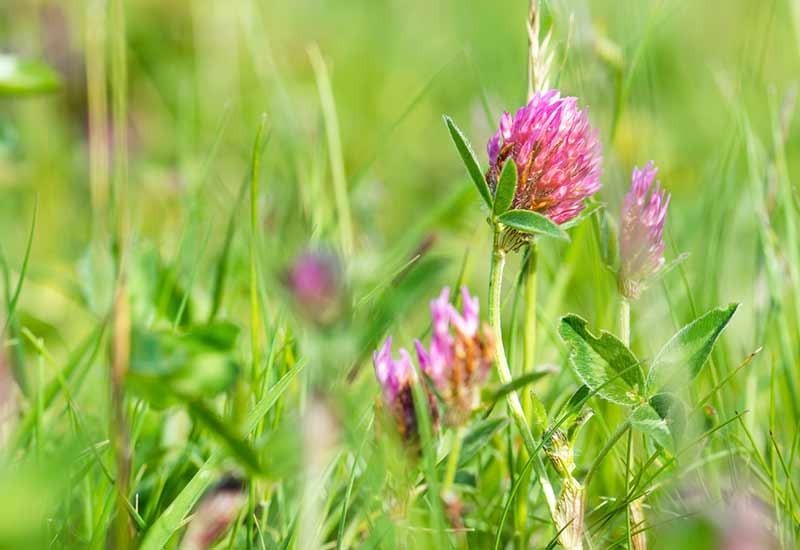Want to know more about veganism and estrogen? Then you've come to the right place! Many people choose a vegan diet because it is environmentally friendly, animal-friendly and also beneficial to health. However, sometimes doubts arise. For example, when it comes to female hormones in plant-based foods - like soy.
In this article you will therefore get all the important information about the connection of the Veganism and the so-called phytoestrogens that you need in a plant-based lifestyle. From the definition, to corresponding foods, their effects and health benefits, to recommended amounts and the often heard rumor of estrogens in soy products. Let's go!
Here is in advance one more Table of contents for orientation:
Notice: This article is not a substitute for medical advice, but only provides general information about phytoestrogens in a plant-based diet. Please consult your doctor if you feel unwell or want to prevent health problems with medical care.
What are estrogens or phytoestrogens?
Phytoestrogens are the secondary plant substances to the hormone estrogen. As the name suggests, these are substances that resemble the hormone estrogen. This is because they have a comparable structure to the female sex hormone 17ß-estradiol.1
Phytoestrogens include Lignans, isoflavones and coumestans. Their various forms are found in about 300 plants. First and foremost, soy is always associated with phytoestrogens. However, many other foods containing phytoestrogens are also a regular part of our diet.
What contains phytoestrogens?
Phytoestrogens are found among others in sage, licorice root and hops. Other foods in which various forms of phytochemicals are found:
- Lignans: Among other things, flaxseed, pumpkin seeds, rye, barley
- Coumestane: red clover, mung bean sprouts, alfalfa sprouts, soybean sprouts, etc.
- Isoflavones: a.o. soybeans and soy products, beans, peas
How do phytoestrogens work?
Phytoestrogens have an influence on many Metabolic processes. They have an effect according to the German Society for Nutrition (DGE) also antioxidant and immunomodulating.2
Often you also hear that phytoestrogens can change the hormone balance, sometimes even myths like "Soy feminizes men". However, their effect is 100-10,000 times weaker than the effect of estrogen. This could be compensated for if the phytoestrogens were present in 100-10,000 times higher quantities. However, this is only achievable if you eat almost exclusively soy products.3
Important Notice: Many studies that attribute negative properties to secondary plant compounds are in vitro studies or studies with Animal testing. According to the DGE, however, these studies cannot be directly transferred to humans.2 Similarly, studies with isolated isoflavone preparations cannot be extrapolated to whole foods such as soybeans.
How do phytoestrogens influence diseases?

Secondary plant compounds have an influence on many different disease patterns. Among them are diseases of civilization such as cancer or cardiovascular diseases. Here I would like to take a look at the health benefits of phytoestrogens.
Cancer
The risk of developing hormone-related cancers such as breast or prostate cancer is reduced by an increased intake of isoflavones.4 The Cancer Council Australia recommends the consumption of soy products, as well as a diet high in plant-based foods, because they can be effective in preventing cancer.5
Cardiovascular diseases
According to studies, soy products have a cholesterol-lowering effect. The lowered cholesterol thus reduces the risk of heart attacks or strokes.6 In clinically manifest atherosclerosis, an increased intake of isoflavones helps. Furthermore, isoflavone supplementation has been found to reduce systolic blood pressure in hypertensive patients.2
The American Heart Association confirms that a Consumption of 25-50 g of soy protein per day safe and effective reduces LDL cholesterol. Therefore, the association recommends including soy products in the diet to promote heart health.7
Tip: For example, 25-50 g of soy protein are contained in about 150-300 g of tofu.
Bone Health
Isoflavone supplementation increased bone mineral density in women by as much as 54 percent. This effect was even stronger in postmenopausal women.2 Thus, it can be assumed that isoflavones can greatly reduce the risk of developing osteoporosis or other bone diseases.
Menopausal symptoms

Hot flashes in particular are among the typical menopausal complaints. According to studies, the isoflavone genistein can reduce the occurrence of sweating and similar complaints, as well as alleviate hot flashes.6
Red clover is one of the plants with the highest phytoestrogen content. Since it has an estrogen-increasing effect, it can be used to compensate for estrogen deficiency during menopause. What is exciting here is that the phytoestrogen in red clover has an anti-estrogen effect when estrogen levels are high.8
Which MEngen of phytoestrogen are recommended?
For example, according to current science, 50-100 mg of isoflavones is safe and recommended. So, in concrete terms, this means that you could eat about 200-400 g of tofu or 150 g of tofu and 250 ml of soy milk to absorb about 60 mg of isoflavones.9
To achieve hormonal effects, one would have to consume vast quantities of foods containing isoflavones, lignans or coumestans. In principle, this is only possible if one were to live exclusively on soy products for an extended period of time. Even the Daily consumption of soy products or other phytoestrogen-containing foods in usual quantities is therefore hormonally harmless.
Soy and phytoestrogens
Soy products are often viewed particularly critically with regard to phytoestrogens. Here it is first necessary to distinguish between fermented and non-fermented soy products. This is because non-fermented soy products contain only very small amounts of hormonally active isoflavones.
In contrast, fermented soy products such as tempeh or miso contain higher amounts. However, in order for the hormonally active isoflavone to actually influence your hormone balance, you would have to eat almost exclusively tempeh or miso.
According to Dietitians of Canada the consumption of soy in a healthy diet is recommended by several national dietary guidelines.10 If you still don't like eating soy, you can easily eliminate soy products from your diet and still eat a vegan diet.
Estrogens in cow's milk
When talking about estrogens in the diet, the focus must also be on cow's milk. The estrogen contained in cow's milk unlike the phytoestrogens discussed so far, is not a plant estrogen and is therefore more potent.
In a Harvard University report, estrogens from cow's milk are considered to be up to 100,000 times more potent referred to as phytoestrogens. Dairy products account for between 60 and 80 percent of dietary estrogens on average. This is of particular concern, he says, because a link is suspected between hormone-dependent cancers and hormones from the diet.11 Furthermore, there is evidence from epidemiological studies that high milk consumption may reduce motile sperm count.12
Veganism and estrogens - No need to worry!
Phytoestrogens can help with many diseases of civilization, either preventively or therapeutically. At the same time, the amounts of phytoestrogen you would need to consume to actually achieve hormonal effects like regular estrogen are extremely high. In a plant-based diet, you would need to consume vast amounts of soy products or other phytoestrogen-containing foods on a daily basis - and this is not the case in a balanced diet.
So you can relax and eat your tofu, tempeh or soy milk without worrying about hormonal effects.
Do you have any questions about this post on veganism and estrogen? Then, as always, feel free to write me a comment!
All the best,

P.S.: If you want to know even more about nutrition, you can find many posts in our Nutrient database. Look for example also my posts about Riboflavin or Vitamin B12 in vegan diet an.
References:
1 N. Rittenau (2018): Vegan-Klischee ade! Scientific answers to critical questions about vegan nutrition. VENTIL-Verlag, Mainz.
2 Deutsche Gesellschaft für Ernährung e. V.: Sekundäre Pflanzenstoffe und ihre Wirkung auf die Gesundheit, https://www.dge.de/wissenschaft/weitere-publikationen/fachinformationen/sekundaere-pflanzenstoffe-und-ihre-wirkung/. [10.08.2021]
3 S. Kulling, B. Watzl (2003): Phytoestrogens. In: Ernährungsumschau 50 (6), pp. 234-239, https://www.ernaehrungs-umschau.de/print-artikel/16-06-2003-phytooestrogene/. [10.08.2021]
4 B. Watzl (2012): Influence of secondary plant compounds on health. In: German Nutrition Society (ed.): 12th Nutrition Report 2012. Bonn, pp. 355-374.
5 Cancer Council Australia (2017): Position statement - Soy, phyto-oestrogens and cancer prevention. Online: http://www.aicr.org/cancer-prevention/food-facts/soy/. [10.08.2021]
6 Zentrum der Gesundheit: Tofu - more than a meat substitute, https://www.zentrum-der-gesundheit.de/ernaehrung/lebensmittel/huelsenfruechte/tofu. [10.08.2021].
7 J. W. Erdman (2000): Soy Protein and Cardiovascular Disease - A Statement for Healthcare Professionals From the Nutrition Committee of the AHA. In: Circulation 102(20), pp. 2555-2559.
8 Zentrum der Gesundheit: Red clover - a real all-rounder, https://www.zentrum-der-gesundheit.de/ernaehrung/nahrungsergaenzung/heilpflanzen/rotklee-ia. [10.08.2021]
9 US Department of Agriculture (2008): USDA Database for the Isoflavone Content of Selected Foods. Release 2.0, https://www.ars.usda.gov/ARSUserFiles/80400525/data/isoflav/isoflav_r2.pdf. [10.08.2021]
10 Dietitians of Canada (2015): What are the health benefits of soy?, https://www.healthyfamiliesbc.ca/home/blog/soy-should-you-eat-it. [10.08.2021]
11 The Harvard Gazette (2006): Hormones in milk can be dangerous, https://news.harvard.edu/gazette/story/2006/12/hormones-in-milk-can-be-dangerous/. [12.08.2021]
12 Ärzteblatt (2018): Do estrogens in cow's milk harm health?, https://www.aerzteblatt.de/blog/98816/Schaden-Oestrogene-in-der-Kuhmilch-der-Gesundheit. [12.08.2021]





